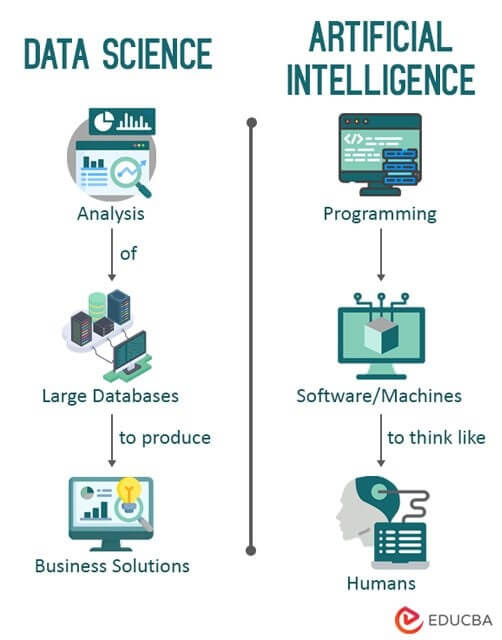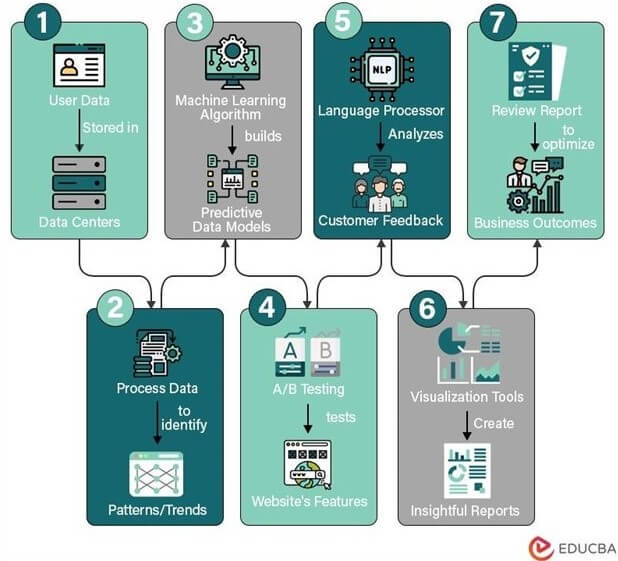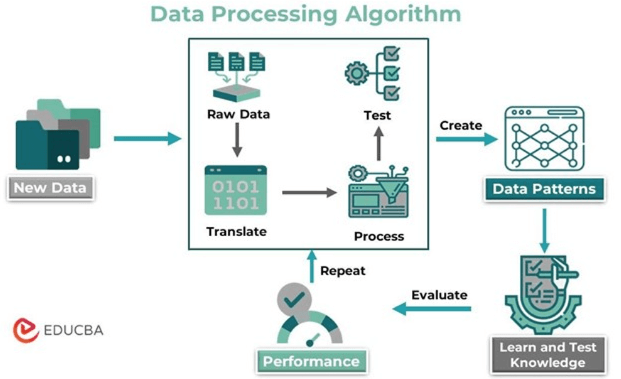Difference Between Data Science vs Artificial Intelligence
Data science vs Artificial Intelligence are two buzzwords that have become increasingly popular in recent times. Although they may sound similar, they are quite different fields. In Data Science vs. Artificial Intelligence, Data Science involves using mathematical and statistical methods to analyze data and gain insights from it. For example, a Data Scientist may work for a healthcare company analyzing data to identify potential health risks in a specific population.
In contrast, Artificial Intelligence focuses on creating machines that can perform tasks that would normally require human intelligence, such as recognizing speech, understanding natural language, and making decisions based on data. One example of Artificial Intelligence in action is a virtual assistant like Siri or Alexa. In fact, these assistants can understand and respond to spoken commands using natural language processing algorithms.
In this article, we will delve into the differences between Data Science and Artificial Intelligence. Additionally, we will discuss how these fields are transforming the way we live and work.

What is Data Science?
Data science involves the study of data using math and technology to find insights and answers. Essentially, its goal is to help individuals and organizations make better decisions and predictions by uncovering patterns and trends in data.
For example, a data scientist might use data science techniques to analyze customer purchase history data for an e-commerce company to identify which products are selling the most, which customers are likely to churn, and which customers are most valuable to the company. Based on these insights, the company can then make informed decisions about product development, marketing, and customer retention strategies.
How Data Science Works? (With Example)

Let us understand how data science works through an example of Amazon.
Step 1: Data Collection
As an online retailer, Amazon collects data on customer behavior, product searches, purchase histories, and more. This data is stored in their data centers for further analysis.
Step 2: Applying data mining techniques
Amazon sifts through the data to identify patterns and trends. For example, they may identify the most popular products or the most frequent search terms.
Step 3: Using machine learning algorithm
Using machine learning algorithms, Amazon builds predictive models that can forecast future outcomes. For instance, they may use customer data to predict which products are likely to be popular in the coming months.
Step 4: Experimenting with A/B testing
Amazon uses A/B testing to experiment with different features on its website, such as different product layouts or pricing strategies. This helps them determine which features are most effective at driving customer engagement and sales.
Step 5: Analyzing customer feedback with NLP
Through the use of NLP, Amazon is able to analyze customer feedback from sources such as product reviews and social media. As a result, they gain valuable insights into customer sentiment and are able to identify areas for improvement in their products and services.
Step 6: Visualizing data insights
Amazon uses data visualization tools to present its findings in a way that is easy to understand. This includes using charts, graphs, and other visual aids to communicate complex data to stakeholders.
Step 7: Driving decision-making with data
By leveraging data science techniques, Amazon can make data-driven decisions that improve its business outcomes. For example, they may use insights from their data to optimize their supply chain or improve their customer experience.
Scope of Data Science
|
Areas |
Scope |
| Business Analytics | Analyzing data to improve business outcomes in areas such as marketing, finance, supply chain management, and more. |
| Healthcare | Analyzing medical data to improve patient outcomes and reduce costs in areas such as disease diagnosis, drug discovery, personalized medicine, and more. |
| Education | Analyzing learning data to enhance the learning experience for students in areas such as adaptive learning, intelligent tutoring systems, and learning analytics. |
| Cybersecurity | Analyzing network traffic to detect and prevent cyber attacks in areas such as intrusion detection, threat intelligence, and security analytics. |
Data Science Jobs & Salary
| Role | Responsibility & Skills | Salary |
| Data Entry Specialist | Enter and process data and maintain accurate records.
|
$30,000 – $57,000 |
| Data Analyst | Create surveys on required subjects to collect and evaluate data.
|
$47,000 – $89,000 |
| Data Engineer | Translate algorithms into code and maintain data set patterns.
|
$67,000 – $134,000 |
| Data Scientist | Collect and verify the data and create predictive systems.
|
$70,000 – $137,000 |
| Data Architect | Designs the structure to organize relational (project-based) data.
|
$82,000 – $168,000 |
| Data Science Manager | Sets definite objectives and methods to attain the goals.
|
$103,000 – $187,000 |
| Data Science Director | Establishes strategies, provides guidance and plans overall goals.
|
$122,000 – $212,000 |
| Vice President, Data Science | Systemize the company’s tools and technologies to build solutions.
|
$146,000 – $299,000 |
(Source: Payscale)
What is Artificial Intelligence?
Artificial Intelligence (AI) is when computers are designed to do things that normally require human intelligence. It’s like giving a machine a brain so it can learn and think like a person. One example of AI is a chatbot that can talk to you like a human. You might have used a chatbot when you’ve had a question about customer service on a website or app. The chatbot can understand what you’re asking and respond with an answer just like a real person.
Self-driving cars are another example of AI. These cars use sensors and software to analyze their surroundings and make decisions about how to drive. They see and understand the world around them, much like a human driver. AI has many exciting possibilities, but it also raises important questions about how we use this technology and its impact on our lives.
How Artificial Intelligence Works? (With Example)

To understand how Artificial Intelligence (AI) works, let’s take the example of a face recognition AI system called “Find a Face”.
Step #1: The AI system learns to recognize human faces by analyzing a vast dataset of images.
The “Find a Face” system studies numerous images of human faces to train itself to recognize different facial features. The system studies feature such as the position of the eyes and the shape of the nose, which helps it recognize and differentiate human faces from one another.
Step #2: The system uses advanced algorithms to identify distinct patterns in the data.
The “Find a Face” system uses sophisticated machine learning algorithms to identify unique patterns in the data. For instance, it may recognize that certain groupings of pixels in an image often indicate the presence of an eye or other facial feature. By detecting these patterns, the system gets better at identifying faces accurately.
Step #3: The system tests its facial recognition capabilities by analyzing unfamiliar images.
After completing the training phase, the “Find a Face” system analyzes new images that it hasn’t seen before to test its ability to recognize faces. The system attempts to detect the position of facial features in each image and match them to the corresponding landmarks.
Step #4: The system refines its algorithms to improve its facial recognition accuracy.
By analyzing the results of its testing, the “Find a Face” system fine-tunes its algorithms to enhance its facial recognition accuracy. For example, if the system struggles to detect a particular facial feature, it may modify its algorithms to look for other related data patterns. This iterative process of refining algorithms continues until the system can accurately recognize human faces across a broad range of images.
Scope of Artificial Intelligence
| Areas | Scope |
| Natural Language Processing | Enabling machines to understand and respond to human language in areas such as chatbots, virtual assistants, and sentiment analysis. |
| Robotics | Enabling machines to act in the physical world in areas such as autonomous vehicles, drones, and manufacturing automation. |
| Image and Video Analysis | Enabling machines to recognize objects, faces, emotions, and more in areas such as facial recognition, object detection, and video surveillance. |
| Recommendation Systems | Providing personalized recommendations for products, services, and content in areas such as e-commerce, entertainment, and social media. |
Artificial Intelligence Jobs & Salary
| Role | Responsibility | Salary |
| Software Developer | Develop automated software to simplify accomplishing tasks.
|
$53,000 – $120,000 |
| Software Engineer | Structure separate software functions into one developed program.
|
$66,000 – $133,000 |
| Artificial Intelligence (AI) Researcher | Create and execute AI tools and evaluate the system’s results.
|
$68,000 – $179,000 |
| Machine Learning Engineer | Build, test, and implement AI machine learning algorithms.
|
$79,000 – $156,000 |
| Solutions Architect | Identify current business issues and create solutions to achieve future goals.
|
$90,000 – $144,000 |
| Product Manager, Software | Mediate between clients and internal teams and manage software development.
|
$93,000 – $162,000 |
| Chief Technology Officer (CTO) | Lead a team of technical professionals and make crucial business decisions.
|
$81,000 – $395,000 |
| Vice President (VP), Engineering | Manage a team of researchers, developers or engineers to attain assigned goals.
|
$188,000 – $259,000 |
(Source: Payscale)
Data Science vs Artificial Intelligence (Infographics)
Below is the Top 7 Comparison between Data Science vs. Artificial Intelligence.

Key Differences between Data Science Vs. Artificial Intelligence
The following main differences between data science vs. artificial intelligence are:
Data Science is a comprehensive process that aims to collect massive amounts of data for analytics and visualization. Artificial Intelligence, on the other hand, is the execution of a predictive model to forecast future events.
- Data Science includes a broad range of statistical methods, whereas AI employs algorithms.
- The tools used in Data Science are far more extensive than those used in AI. It is because Data Science involves several steps for analyzing and generating insights from data.
- SAS, SPSS, Keras, R, Python, and other tools in data science, whereas AI uses tools such as Shogun, Mahout, Caffe, PyTorch, TensorFlow, and Scikit-Learn.
- Users build models using statistical insights with Data Science. AI, on the other hand, is to create models that resemble cognition and human understanding.
- In contrast to AI, data science does not require a high level of scientific processing.
Final Thoughts
Data science and artificial intelligence are different but related fields that are changing how we use data to advance and improve. By recognizing their individual strengths and abilities, we can effectively leverage these technologies. As a result, we can drive progress in different industries and make the world a better place.
FAQs
Q1. Which is better: data science or artificial intelligence?
Answer: Data science and artificial intelligence are two distinct fields with different problem-solving approaches. Data science relies on analytical tools to collect and interpret data, while artificial intelligence uses algorithms and software to identify patterns in data.
Choosing between the two depends on your career goals. If you’re interested in research, data science may be the better path. On the other hand, if you want to develop intelligent software products, machine learning or AI could be the best option for you.
Q2. Who earns more AI or data science?
Answer: In terms of salaries, the average income for AI professionals is higher than that of data science professionals. While data science professionals earn an average of $72,000 per year, those in the AI industry make an average of $130,000 per year. However, it’s important to note that salaries can vary depending on the specific role and responsibilities of an employee within either field.
Q3. Which is easy, AI or data science?
Answer: It’s not easy to say which is easier to learn, AI or data science. They overlap, but AI has two parts called machine learning and deep learning, which both use data science. Data science uses machine and deep learning to understand data. Generally, it’s simpler to learn data science than AI, because data science is about analyzing data using math and stats, while AI is about making machines that can do things like humans do.
Recommended Article
This is a guide to the top differences between data science vs. artificial intelligence. Here we also discuss the data science vs. artificial intelligence key differences with infographics and comparison tables. You may also have a look at the following articles –

